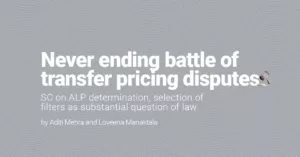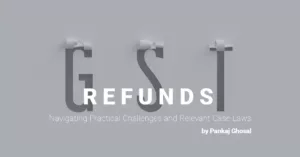Background
The disputes between the tax administration and the taxpayers are a perennial phenomenon. Investors/businesses always prefer certainty in their tax liabilities so that the same can be adequately budgeted for, in the cost of business/investment transactions.
Keeping this in mind, the Authority for Advance Rulings (‘AAR’) was constituted with an intent to provide a platform for non-residents to approach and determine their tax liability in advance, to avoid long drawn and expensive litigation. Provisions for AAR were introduced by the Finance Act, 1993 specifically for the non-resident taxpayers in India.
The initial confidence generated by the AAR made it popular amongst the non-resident investors and its resultant benefit was also extended to resident taxpayers as well as for excise and customs cases.
The purpose of this article is to highlight the benefits of approaching AAR along with highlighting the cases where it may be futile to approach AAR.
Broad Regulations For AAR
AAR can be approached by the following people/entities to seek an advance ruling in the cases mentioned below:
- a non-resident, for any transaction
- a resident, for the purposes of determination of tax liability of the non-resident in case there is a proposed (or undertaken) transaction between the two
- a resident, who has undertaken or proposes to undertake one or more transactions aggregating to INR 1 Bn or more in aggregate
- a public sector company as defined in Section 2 (36A) of the Income Tax Act, for any transaction
- any person, whether a resident or a non-resident, to check if an arrangement proposed to be undertaken by them is an impermissible avoidance arrangement under GAAR provisions or not.
Where an application is filed and is admitted, the AAR pronounces its advance ruling on the question specified in the application. A time limit of 6 months is provided for the pronouncement of advance ruling, after the receipt of the application by authority. However, said time limit is directory in nature and it generally takes 12-18 months.
Benefits Of An Advance Ruling
There are certain and clear benefits of obtaining an advance ruling:
- The non-resident investor can be sure of its liability towards income tax, even before the commencement of investment/business in India.
- Public sector companies can take advantage of getting a ruling on issues which are pending before any tax authority or tribunal
- Since the matter decided by AAR can’t be subjected to litigation by the Income Tax Authorities (provided there is no change in law or facts), it saves the litigation cost of the applicant
- Against the ruling of AAR, the applicant/Income Tax Department can directly file a writ petition before the High Court. Therefore, within three to five years, the issue can be settled by the High Court.
Areas In Which Advance Rulings Can Be Sought
An advance ruling can be sought on any question of law or fact specified in the application, in relation to a transaction which has been undertaken or is proposed to be undertaken. However, as per the first proviso to Section 245R (2), an advance ruling cannot be sought where the question:
- is already in a specific case of a taxpayer before any appellate authority or any tax court. However, aforesaid is not applicable in the case public sector companies, if the question sought is pending before the Income Tax authorities or any Appellate Tribunal
- involves a transaction which is designed prima facie for the avoidance of income tax. However, this restriction not applicable, if the applicant is a public sector company or any person (i.e., resident or non-resident) is making an application to determine whether an arrangement proposed to be undertaken is an impermissible avoidance arrangement under Chapter X-A of the Act
- involves the determination of fair market value of any property.
Generally, AAR is best suited to sort out complex issues of taxation including those concerning the interpretation of Double Taxation Avoidance Agreements (DTAAs) which arise consequently due to the difference in opinion between the tax collectors and the taxpayers.
Issues/Questions Generally Dealt With By AAR Till Now
Till date, AAR has given more than 350 rulings. Most of them have been on the issues mentioned below:
- Determination of taxation of non-residents under the Income Tax Act for contentious issues in international taxation like fees for technical services, royalty, Constitution of Permanent Establishment, determination of residence, etc.
- Taxation of international partnerships
- Transfer of assets into and out of tax jurisdictions vis-à-vis Indian taxation
- Applicability of DTAAs and their use in taxation planning, e.g., determination of permanent establishment and residence
- Taxation of investment funds, venture capital funds, offshore funds, financial instruments and derivatives, cross border leasing
- Issues relating to withholding of tax and accompanying penal provisions
- Taxation of e-commerce
Our Perspective
Advance rulings are a good mechanism to provide tax certainty on complex business transactions undertaken by non-resident investors. This creates a conducive environment for attracting foreign investments in India. This concept, based on the canon of certainty, is intended to overcome the obvious disadvantage of an uncertain tax position, so that the taxpayer is fore-warned about the tax ramifications of the action it proposes to undertake.
However, there have been instances where despite a favourable advance ruling, the taxpayer must undergo a detailed scrutiny with tax authorities. This largely happens in cases where the AAR decides the matter on facts which are yet to happen or are yet to be established, for e.g., determination of Permanent Establishment, taxability of offshore supply etc.
Since the AAR is basing its judgement on facts as envisaged by the taxpayer, it is not in a position to verify such facts. Hence, the tax authorities intervene at a later stage to verify the facts by digging deeper in the case. Invariably, in such cases, benefits of having a favourable advance ruling are nullified to a large extent.
Also, since AAR is not the final authority, a pronouncement by AAR is prone to litigation. The Supreme Court has, in the case of Columbia Sports Wear held that the orders of AAR can be challenged by filing a Writ Petition before the High Court.
Moreover, SLP against an advance ruling could also be considered by the Supreme Court if it involves a question of principle of great importance or if a similar question is already pending before the Supreme Court.
Given that the courts in India are already burdened with many cases, one would need to wait and see how the matters pertaining to AAR are taken up, and extent of time is taken for decision in these cases at the High Court level. Given the dynamic nature of the business and international trade, especially in cases where businesses are looking at fresh investment, if the overall time period for obtaining certainty is considerable, it may dilute the very purpose for which the AAR was approached.
Hence, the certainty of facts is one extremely important element while approaching AAR, considering that advance rulings are forward-looking, i.e., obtained prior to the transactions. Therefore, having clearly laid-out facts which are substantiated as much as possible becomes imperative.
—
Written by
Shrey Aggarwal, in collaboration with the Coinmen Research Team.










